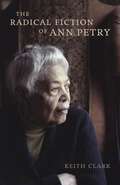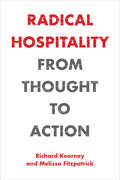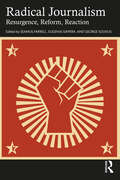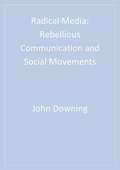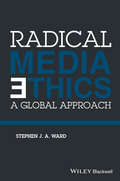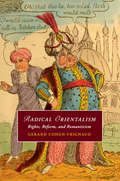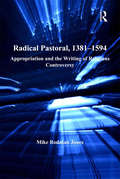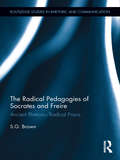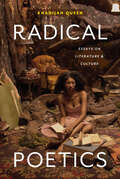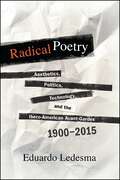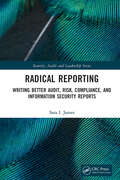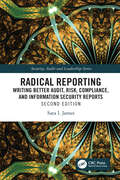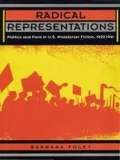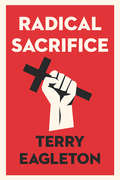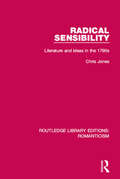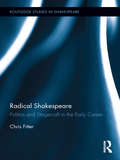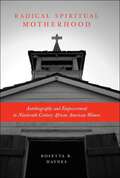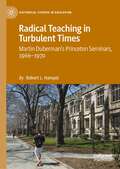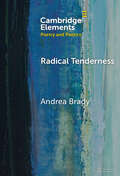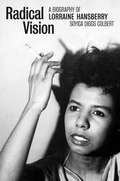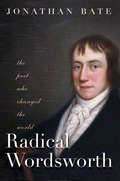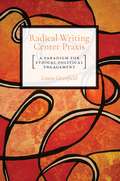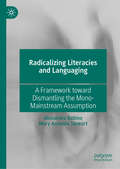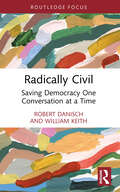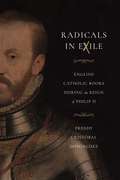- Table View
- List View
The Radical Fiction of Ann Petry: A Novel
by Keith ClarkIn his in-depth analysis of the works of Ann Petry (1908--1997), Keith Clark moves beyond assessments of Petry as a major mid-twentieth-century African American author and the sole female member of the "Wright School of Social Protest." He focuses on her innovative approaches to gender performance, sexuality, and literary technique. Engaging a variety of disciplinary frameworks, including gothic criticism, masculinity and gender studies, queer theory, and psychoanalytic theory, Clark offers fresh readings of Petry's three novels and collection of short stories. He explores, for example, Petry's use of terror in The Street, where both blacks and whites appear physically and psychically monstrous. He identifies the use of dark comedy and the macabre in the stories "The Bones of Louella Brown" and "The Witness." Petry's overlooked second novel, Country Place -- set in a deceptively serene Connecticut hamlet -- camouflages a world as nightmarish as the Harlem of her previous work. While confirming the black feminist dimensions of Petry's writing, Clark also assesses the writer's representations of an array of black and white masculine behaviors -- some socially sanctioned, others taboo -- in her unheralded masterpiece The Narrows and her widely anthologized short story "Like a Winding Sheet." Expansive in scope, The Radical Fiction of Ann Petry analyzes Petry's unique concerns and agile techniques, situating her among more celebrated male contemporary writers.
Radical Hospitality: From Thought to Action (Perspectives in Continental Philosophy)
by Richard Kearney Melissa FitzpatrickRadical Hospitality addresses a timely and challenging subject for contemporary philosophy: the ethical responsibility of opening borders, psychic and physical, to the stranger. Kearney and Fitzpatrick show how radical hospitality happens by opening oneself in narrative exchange to someone or something other than ourselves—by crossing borders, whether literal or figurative. Against the fears, dogmas, and demands for certainty and security that push us toward hostility, we also desire to wager with the unknown, leap into the unanticipated, and celebrate the new, a desire this book seeks to recognize and cultivate. The book contends that hospitality means chancing one’s hand, one’s arm, one’s very self, thereby opening a vital space for new voices to be heard, shedding old skins, and welcoming new understandings.Radical Hospitality engages with urgent moral conversations concerning identity, nationality, immigration, commemoration, and justice, moving between theory and praxis and on to the formative life of the classroom. Building on key critical debates on the question of hospitality ranging from phenomenology, hermeneutics and deconstruction to neo-Kantian moral critique and Anglo-American virtue ethics, the book explores novel possibilities for an ethics of hospitality in our contemporary world of border anxiety, refugee crises, and ecological catastrophe.
Radical Journalism: Resurgence, Reform, Reaction
by Seamus Farrell Eugenia Siapera George SouvlisThis edited volume offers a state-of-the-art synthesis of the historical role of radical journalism, its present iterations, and plans for the future of a journalism that is committed to liberatory movements and politics. At a time of profound crisis and stagnation for mainstream journalism, radical journalism seems to be riding a wave. New outlets, including those – like Jacobin – with a global reach, have sprung up, presenting a new generation of unapologetically progressive publications with an emancipatory agenda. Understanding the role and place of radical journalism becomes even more urgent given the current political climate in a (post) pandemic world with heightened inequalities and intensified pauperisation. Drawing on contributions from leading academics, this collection considers: • How new outlets fit in the genealogy of (radical) journalism and what their flourishing can tell us about the present and future of emancipatory politics and the role of the radical journalist; • What these new forms and publications mean for mainstream journalism and its persisting problems of financial sustainability and professional journalistic labour; • Important challenges presented by, for example, the resurgence of fascism, authoritarianism and the mainstreaming of the far right; • Essential questions of what radical journalism looks like today, what forms it takes or should take, and what its future might be. Radical Journalism is recommended reading for advanced students and journalists working at the intersection of journalism, politics, and sociology.
Radical Media: Rebellious Communication and Social Movements
by Professor John D. DowningThis is an entirely new edition of the author's 1984 study (originally published by South End Press) of radical media and movements. The first and second sections are original to this new edition. The first section explores social and cultural theory in order to argue that radical media should be a central part of our understanding of media in history. The second section weaves an historical and international tapestry of radical media to illustrate their centrality and diversity, from dance and graffiti to video and the internet and from satirical prints and street theatre to culture-jamming, subversive song, performance art and underground radio. The section also includes consideration of ultra-rightist media as a key contrast case. The book's third section provides detailed case studies of the anti-fascist media explosion of 1974-75 in Portugal, Italy's long-running radical media, radio and access video in the USA, and illegal media in the dissolution of the former Soviet bloc dictatorships.
Radical Media Ethics: A Global Approach (Disruptions Ser.)
by Stephen J. WardRadical Media Ethics presents a series of innovative ethical principles and guidelines for members of the global online media community. Offers a comprehensive new way to think about media ethics in a new media era Provides guiding principles and values for practising responsible global media ethics Introduces one of the first codes of conduct for a journalism that is global in reach and impact Includes both philosophical considerations and practical elements in its establishment of new media ethics guidelines
Radical Orientalism: Rights, Reform, and Romanticism (Cambridge Studies in Romanticism)
by Gerard Cohen-VrignaudThis fascinating study reveals the extent to which the Orientalism of Byron and the Shelleys resonated with the reformist movement of the Romantic era. <p><p> It documents how and why radicals like Bentham, Cobbett, Carlile, Hone and Wooler, among others in post-Revolutionary Britain, invoked Turkey, North Africa and Mughal India when attacking and seeking to change their government's domestic policies. Examining a broad archive ranging from satires, journalism, tracts, political and economic treatises, and public speeches, to the exotic poetry and fictions of canonical Romanticism, Gerard Cohen-Vrignaud shows that promoting colonization was not Orientalism's sole ideological function. Equally vital was its aesthetic and rhetorical capacity to alienate the people's affection from their rulers and fuel popular opposition to regressive taxation, penal cruelty, police repression, and sexual regulation.
Radical Pastoral, 1381–1594: Appropriation and the Writing of Religious Controversy
by Mike Rodman JonesFrom William Langland's Piers Plowman, through the highly polemicized literary culture of fifteenth-century Lollardy, to major Reformation writers such as Simon Fish, William Tyndale and John Bale, and into the 1590s, this book argues for a vital reassessment of our understanding of the literary and cultural modes of the Reformation. It argues that the ostensibly revolutionary character of early Protestant literary culture was deeply indebted to medieval satirical writing and, indeed, can be viewed as a remarkable crystallization of the textual movements and polemical personae of a rich, combative tradition of medieval writing which is still at play on the London stage in the age of Marlowe and Shakespeare. Beginning with a detailed analysis of Piers Plowman, this book traces the continued vivacity of combative satirical personae and self-fashionings that took place in an appropriative movement centred on the figure of the medieval labourer. The remarkable era of Protestant 'plowman polemics' has too often been dismissed as conventional or ephemeral writing too stylistically separate to be linked to Piers Plowman, or held under the purview of historians who have viewed such texts as sources of theological or documentary information, rather than as vital literary-cultural works in their own right. Radical Pastoral, 1381-1594 makes a vigorous case for the existence of a highly politicised tradition of 'polemical pastoral' which stretched across the whole of the sixteenth century, a tradition that has been largely marginalised by both medievalists and early modernists.
The Radical Pedagogies of Socrates and Freire: Ancient Rhetoric/Radical Praxis (Routledge Studies in Rhetoric and Communication)
by Stephen BrownSituating contemporary critical praxis at the intersection of the social, the political, and the rhetorical, this book is a provocative inquiry into the teaching philosophies of Plato’s Socrates and Paulo Freire that has profound implications for contemporary education. Brown not only sheds new light on the surprising and significant points of intersection between ancient rhetoric and radical praxis as embodied in the teaching philosophies of Socrates and Freire, using the philosophy of each to illumine the teaching of the other, but uses this analysis to lead contemporary education in a bold new direction, articulating a vision for a neo-humanist pragmatism. The book draws on the post-Freudian theories of Jacques Derrida, Peter Brooks, and Otto Rank, as well as on the neo-pragmatism of Cornell West to craft a new radical pedagogy configured to the realities of "post flash-crash" America. In the process, it discovers a space for a much broader application of Freire’s teaching philosophy than previous works, moving beyond a narrow focus on "liberatory" pedagogy or "teaching resistance," toward a neo-humanist pragmatism emphasizing interactive learning, problem-posing analysis, and civic engagement. Brown crafts a social-epistemic praxis that fuses the pedagogies of Freire and Socrates, joining the analytical, the ethical, and the political as part of an inquiry and intervention into the real, the good, and the possible that poses problematic aspects of contemporary reality in a search for the program content of a Pedagogy of Social Change.
Radical Poetics: Essays on Literature & Culture (Poets On Poetry)
by Khadijah QueenLiterature has the power to help build a shelter in language for a way of being that holds integrity and love as its root. In the tradition of Audre Lorde, Angela Davis, and many other Black writers and theorists, poet and professor Khadijah Queen observes questions of life and literature, human feeling and behavior, and explores language-based solutions to common cultural conflicts that are often rooted in harmful assumptions. Instead of operating from a base of unquestioned thought and systemic tradition, Radical Poetics presents more inclusive and accurate ways of contemplating literary work. Building on ideas and theoretical practices from Édouard Glissant, Toni Morrison, bell hooks, Saidiya Hartman, and Kimberlé Crenshaw, Queen reads for where love is present as well as for where it is absent—tracing systems of thought and aesthetic choices to track how characters are portrayed in terms of race, gender, class, and disability. She analyzes short stories, novels, nonfiction narratives, poetry, and a play from authors such as Herman Melville, Kate Chopin, Dionne Brand, Frances Ellen Watkins Harper, Ma-ka-tai-me-she-kia-kiak, Sor Juana Inés de la Cruz, Natasha Trethewey, and Muriel Rukeyser. Queen’s essays offer shifts in thinking about language—beyond calling out the ways language punishes vulnerability, entrenches harm, and suppresses true intercultural communication. Her intuitive approach aims to correct inaccuracies that have served as a foundation for the discriminatory thinking that undergirds American institutions and culture, particularly the continued glorification of violence. Radical Poetics makes a case for the imperative and practical value of understanding poetics beyond artistic and academic spaces and into everyday life.
Radical Poetry: Aesthetics, Politics, Technology, and the Ibero-American Avant-Gardes, 1900-2015 (SUNY series in Latin American and Iberian Thought and Culture)
by Eduardo LedesmaWith a broad geographic and linguistic sweep covering more than one hundred years of poetry, this book investigates the relationships between and among technology, aesthetics, and politics in Ibero-American experimental poetry. Eduardo Ledesma analyzes visual, concrete, kinetic, and digital poetry that questions what the "literary" means, what constitutes poetry, and how, if at all, visual and verbal arts should be differentiated. Radical Poetry examines how poets use the latest technologies (cinematography, radio, television, and software) to create poetry that self-consciously interrogates its own form, through close alliances with conceptual and abstract art, performance, photography, film, and new media. To do so, Ledesma draws on pertinent theories of metaphor, affect, time, space, iconicity, and cybernetics. Ledesma shows how José Juan Tablada (Mexico), Joan Salvat-Papasseit (Catalonia), Clemente Padín (Uruguay), Fernando Millán (Spain), Décio Pignatari (Brazil), Ana María Uribe (Argentina), and others turn words, machines, and, more recently, the digital into flesh, making word-objects "come alive" by assembling text to act and seem human, whether on the page, on walls, or on screens.
Radical Reporting: Writing Better Audit, Risk, Compliance, and Information Security Reports (Security, Audit and Leadership Series)
by Sara I. JamesMost people dread writing reports; they also dread reading reports. What they don’t realize is that the techniques that make writing more readable make it more powerful. This is especially relevant for professionals in areas such as audit, risk, compliance, and information security. This small volume provides the tools and techniques needed to improve reports. It does so through addressing crucial concepts all too often overlooked in the familiar rush to perform tasks, complete projects, and meet deadlines. These concepts – the role of culture in communication; the link between logic and language; the importance of organizing thoughts before writing; and how to achieve clarity – may seem academic or theoretical. They’re not. Unless writers understand their own thoughts, actions, and objectives, they cannot hope to communicate them at all – let alone clearly.
Radical Reporting: Writing Better Audit, Risk, Compliance, and Information Security Reports (Security, Audit and Leadership Series)
by Sara I. James"If I were giving out an award for 'book of the year' for internal audit professionals, I would certainly award it to her outstanding manuscript: Radical Reporting: Writing Better Audit, Risk, Compliance and Information Security Reports." - Richard Chambers, Former President and CEO, The Institute of Internal AuditorsMost people dread writing reports; they also dread reading reports. What they don’t realize is that the techniques that make writing more readable make it more powerful. This is especially relevant for professionals in areas such as audit, risk, compliance, and information security.This small volume provides the tools and techniques needed to improve reports. It does so through addressing crucial concepts all too often overlooked in the familiar rush to perform tasks, complete projects, and meet deadlines.These concepts – the role of culture in communication; the link between logic and language; the importance of organizing thoughts before writing; and how to achieve clarity – may seem academic or theoretical. They’re not. Unless writers understand their own thoughts, actions, and objectives, they cannot hope to communicate them at all – let alone clearly.This second edition develops these points with additional material on critical thinking, as well as the use of AI in reporting.
Radical Representations: Politics and Form in U.S. Proletarian Fiction, 1929–1941
by Barbara FoleyIn this revisionary study, Barbara Foley challenges prevalent myths about left-wing culture in the Depression-era U.S. Focusing on a broad range of proletarian novels and little-known archival material, the author recaptures an important literature and rewrites a segment of American cultural history long obscured and distorted by the anti-Communist bias of contemporaries and critics.Josephine Herbst, William Attaway, Jack Conroy, Thomas Bell and Tillie Olsen, are among the radical writers whose work Foley reexamines. Her fresh approach to the U.S. radicals' debates over experimentalism, the relation of art to propaganda, and the nature of proletarian literature recasts the relation of writers to the organized left. Her grasp of the left's positions on the "Negro question" and the "woman question" enables a nuanced analysis of the relation of class to race and gender in the proletarian novel. Moreover, examining the articulation of political doctrine in different novelistic modes, Foley develops a model for discussing the interplay between politics and literary conventions and genres.Radical Representations recovers a literature of theoretical and artistic value meriting renewed attention form those interested in American literature, American studies, the U. S. left, and cultural studies generally.
Radical Sacrifice
by Terry EagletonA trenchant analysis of sacrifice as the foundation of the modern, as well as the ancient, social order The modern conception of sacrifice is at once cast as a victory of self-discipline over desire and condescended to as destructive and archaic abnegation. But even in the Old Testament, the dual natures of sacrifice, embodying both ritual slaughter and moral rectitude, were at odds. In this analysis, Terry Eagleton makes a compelling argument that the idea of sacrifice has long been misunderstood. Pursuing the complex lineage of sacrifice in a lyrical discourse, Eagleton focuses on the Old and New Testaments, offering a virtuosic analysis of the crucifixion, while drawing together a host of philosophers, theologians, and texts—from Hegel, Nietzsche, and Derrida to the Aeneid and The Wings of the Dove. Brilliant meditations on death and eros, Shakespeare and St. Paul, irony and hybridity explore the meaning of sacrifice in modernity, casting off misperceptions of barbarity to reconnect the radical idea to politics and revolution.
Radical Sensibility: Literature and Ideas in the 1790s (Routledge Library Editions: Romanticism #19)
by Chris JonesFirst published in 1993. Radical Sensibility provides a detailed account of the interrelations of literature, ideas and history in the eighteenth century’s Revolutionary decade. The book traces a continuity of ideas from Shaftesbury to Godwin and Wollstonecraft, and sets it beside a conservative tradition established in the work of Hume and Adam Smith. As a guide to the transformations of ‘sensibility’ as a concept, Jones examines the trajectories of three writers who work spans the decade: Charlotte Smith, Helen Maria Williams, and the early Wordsworth. A mixture of literary textual analysis and historical and political documentation, Radical Sensibility will be important reading for students and teachers of poetry, ideas and the novel.
Radical Shakespeare: Politics and Stagecraft in the Early Career (Routledge Studies in Shakespeare)
by Chris FitterThis book argues that Shakespeare was permanently preoccupied with the brutality, corruption, and ultimate groundlessness of the political order of his state, and that the impact of original Tudor censorship, supplemented by the relatively depoliticizing aesthetic traditions of later centuries, have together obscured the consistent subversiveness of his work. Traditionally, Shakespeare’s political attitudes have been construed either as primarily conservative, or as essays in richly imaginative ambiguation, irreducible to settled viewpoints. Fitter contends that government censorship forced superficial acquiescence upon Shakespeare in establishment ideologies — monarchic, aristocratic and patriarchal — that were enunciated through rhetorical set pieces, but that Shakespeare the dramatist learned from Shakespeare the actor a variety of creative methods for sabotaging those perspectives in performance in the public theatres. Using historical contextualizations and recuperation of original performance values, the book argues that Shakespeare emerged as a radical writer not in middle age with King Lear and Coriolanus — plays whose radicalism is becoming widely recognized — but from his outset, with Henry VI and Taming of the Shrew. Recognizing Shakespeare’s allusiveness to 1590s controversies and dissident thought, and recovering the subtextual politics of Shakespeare’s distinctive stagecraft reveals populist, at times even radical meaning and a substantially new, and astonishingly interventionist, Shakespeare.
Radical Spiritual Motherhood: Autobiography and Empowerment in Nineteenth-Century African American Women
by Rosetta R. HaynesIn this cutting-edge work, Rosetta R. Haynes explores the spiritual autobiographies of five nineteenth-century female African American itinerant preachers to discover the ways in which they drew upon religion and the material conditions of their lives to fashion powerful personas that enabled them to pursue their missions as divinely appointed religious leaders. Haynes examines the lives and narratives of Jarena Lee (1783--?), Zilpha Elaw (c. 1790--?), Julia Foote (1823--1900), Amanda Berry Smith (1837--1915), and Rebecca Cox Jackson (1795--1871) through an innovative conceptual framework Haynes terms "radical spiritual motherhood" -- an empowering identity deriving from the experience of "sanctification," a kind of spiritual perfection following conversion. Drawing upon conventional nineteenth-century standards for motherhood, radical spiritual motherhood also challenges traditional standards: These were women whose religious missions authorized them to preach in public, to assume an activist role, and to declare sexual autonomy through celibacy. They redefined their relationships to the powers that be by becoming instruments of God in a kind of protofeminist gesture. Haynes uses historical methods, feminist literary theory, and liberation theology to investigate the ways these women, as reflected especially in their autobiographies, employed the idea of motherhood to fashion strong, authentic identities as women called to preach the gospel.Though radical spiritual motherhood is an identity specifically adopted by free black women, the lives and texts of these itinerant preachers retain close ties to those of enslaved black women through the negative cultural stereotypes assigned to both groups. To illustrate this connection, Haynes analyzes the writings of the preachers within the context of the narratives of former slaves Harriet Jacobs, Mary Prince, and Sojourner Truth. Haynes also links the lineage of radical spiritual motherhood to a modern woman by considering Pauli Murray (1910--1985), the first African American woman (and the second African American) to be ordained as an Episcopal priest. By looking at Murray's intellectual and spiritual development, especially her feminist ideologies, social activism, and espousal of liberation theology, Haynes shows that Murray was in fact a modern-day radical spiritual mother.Pioneering and accessible, Radical Spiritual Motherhood marks a turning point in the study of both African American literature and women's studies.
Radical Teaching in Turbulent Times: Martin Duberman’s Princeton Seminars, 1966–1970 (Historical Studies in Education)
by Robert L. HampelFrom 1966 to 1970, historian Martin Duberman transformed his undergraduate Princeton seminar on American radicalism. This book looks closely at the seminar, drawing on interviews with former students and colleagues, conversations with Duberman, and abundant archival material in the Princeton archives and the Duberman Papers. The array of evidence makes the book a primer on how historians gather and interpret evidence while at the same time shining light on the tumultuous late 1960s in American higher education. This book will become a tool for teaching, inspiring educators to rethink the ways in which history is taught and teaching students how to reason historically through sources.
Radical Tenderness: Poetry in Times of Catastrophe (Elements in Poetry and Poetics)
by Andrea BradyRadical Tenderness argues for the importance of poetry in negotiating political and social catastrophes, through a focus on the unusual intimacies of committed writing. How do poets negotiate between the personal and the public, the bedroom and the street, the family and class or communal ties? How does contemporary lyric, with its emphasis on the feelings and perceptions of the individual subject, speak to moments of shared crisis? What can poetry tell us about how care shapes our experiences of history? How do the intimacies found in protest, on strike, in riots, and in spaces of oppression, transform individual lives and political movements? Through a series of focussed readings of four twenty-first century poets - Caleb Femi, Bhanu Kapil, Juliana Spahr and Anne Boyer - Radical Tenderness reflects the perspectives provided by intimate poetries on the shared political emergencies of poverty, war, ecological catastrophe, racism, and illness.
Radical Vision: A Biography of Lorraine Hansberry
by Soyica Diggs ColbertA &“loving, lavishly detailed&” (New York Times) and captivating portrait of Lorraine Hansberry&’s life, art, and political activism—one of O Magazine's best books of April 2021&“Hits the mark as a fresh and timely portrait of an influential playwright.&”—Publishers Weekly In this first scholarly biography of Lorraine Hansberry, Soyica Diggs Colbert narrates a life at the intersection of art and politics, arguing that for Hansberry the theater operated as a rehearsal room for her political and intellectual work. Celebrated for her play A Raisin in the Sun, Hansberry was also the author of innovative journalism and of plays touching on slavery, interracial communities, and Black freedom movements. Hansberry was deeply involved in the Black freedom struggle during the Cold War and in the early civil rights movement, and here Colbert shows us an artist&’s life with the background of the Greenwich Village art scene in the 1960s, the homophile movement, Black diasporic freedom movements, and third-wave feminism. Drawing from Hansberry&’s papers, speeches, and interviews, this book provides a new point of entry in the history of Black radicalism, and a new perspective on Black women in mid‑twentieth‑century political movements.
Radical Wordsworth: The Poet Who Changed the World
by Jonathan BateOn the 250th anniversary of Wordsworth&’s birth comes a highly imaginative and vivid portrait of a revolutionary poet who embodied the spirit of his age Published in time for the 250th anniversary of William Wordsworth&’s birth, this is the biography of a great poetic genius, a revolutionary who changed the world. Wordsworth rejoiced in the French Revolution and played a central role in the cultural upheaval that we call the Romantic Revolution. He and his fellow Romantics changed forever the way we think about childhood, the sense of the self, our connection to the natural environment, and the purpose of poetry. But his was also a revolutionary life in the old sense of the word, insofar as his art was of memory, the return of the past, the circling back to childhood and youth. This beautifully written biography is purposefully fragmentary, momentary, and selective, opening up what Wordsworth called "the hiding-places of my power."
Radical Writing Center Praxis: A Paradigm for Ethical Political Engagement
by Laura GreenfieldIn Radical Writing Center Praxis Laura Greenfield calls for a paradigm change in writing centers, imagining a field whose very reason for being is to facilitate justice and peace. The book calls on readers to more critically examine power and agency in writing centers and to imagine new possibilities for the field’s theories and practices. Large, intersecting systems of oppression manifest in the everyday practices of institutions, classrooms, and writing centers. Local practices in turn influence the surrounding world. Radical Writing Center Praxis therefore challenges the writing center field to resist assumptions of political neutrality and instead to redefine itself in terms of more explicit ethical commitments. In this paradigm it is clear that to engage in anti-oppression work is not merely a special interest but rather a vital interest to all. Introducing the concepts and vocabulary of radical politics, Radical Writing Center Praxis examines the tensions between the field’s professed beliefs and everyday practices and offers a process by which the writing center discipline as a whole might rebuild itself anew. It will be invaluable to writing center directors, tutors, scholars, and students as well as to administrators and compositionists.
Radicalizing Literacies and Languaging: A Framework toward Dismantling the Mono-Mainstream Assumption
by Alexandra Babino Mary Amanda StewartThis book names and confounds the mono-mainstream assumption that invisibly frames much research, the ideologies that normalize monolingualism, monoculturalism, monoliteracy, mononationalism, and/or monomodal ways of knowing. In its place, the authors propose multi- and trans- lenses of these phenomena steeped in a raciolinguistic perspective on Bourdieu’s reflexive sociology to move toward a more accurate, multidimensional view of racialized peoples’ literacy and language practices. To achieve this, they first engage in a comprehensive review of literacies, languaging, and a critical sociocultural framework. Then, the distinct testimonios of four women underscore this framework in practice, followed by action steps for research, policy, and pedagogy. This book will be of particular interest to literacy and language education researchers.
Radically Civil: Saving Democracy One Conversation at a Time (Routledge Research in Political Communication)
by Robert Danisch William KeithIf you feel like the world has gone to hell in a handbasket, you’re not alone. If you often feel there’s nothing you can do about it, you’re also not alone. Along with this increasing anger, fear, and frustration, much confusion still prevails on the appropriate communication practices for responding to difficult situations and improving our lives. Communication experts, Robert Danisch and William Keith, explain why and how we can practice radical civility in this practical guide to everyday “political” communication. This guide begins with examples of radical civility to show the potential of this kind of communication to change minds and bridge differences. The authors then unpack the three foundational principles of radical civility as useful theoretical tools for thinking throughout interactions with others in civic spaces. This is then followed by a three-step process for practicing radical civility drawing on research into active listening and its importance for creating connections, validating other views, and opening up possibilities for future conversation. The guide concludes with evidence-based communication practices and prescriptive recommendations for how to do each and show examples of each in action. Radically Civil: Saving Democracy One Conversation at a Time is a much-needed communication-based antidote to polarization, preparing students, researchers, and community leaders to be responsible participants in today’s society.
Radicals in Exile: English Catholic Books During the Reign of Philip II (Iberian Encounter and Exchange, 475–1755 #4)
by Freddy Cristóbal DomínguezFacing persecution in early modern England, some Catholics chose exile over conformity. Some even cast their lot with foreign monarchs rather than wait for their own rulers to have a change of heart. This book studies the relationship forged by English exiles and Philip II of Spain. It shows how these expatriates, known as the "Spanish Elizabethans," used the most powerful tools at their disposal—paper, pens, and presses—to incite war against England during the "messianic" phase of Philip’s reign, from the years leading up to the Grand Armada until the king’s death in 1598.Freddy Cristóbal Domínguez looks at English Catholic propaganda within its international and transnational contexts. He examines a range of long-neglected polemical texts, demonstrating their prominence during an important moment of early modern politico-religious strife and exploring the transnational dynamic of early modern polemics and the flexible rhetorical approaches required by exile. He concludes that while these exiles may have lived on the margins, their books were central to early modern Spanish politics and are key to understanding the broader narrative of the Counter-Reformation.Deeply researched and highly original, Radicals in Exile makes an important contribution to the study of religious exile in early modern Europe. It will be welcomed by historians of early modern Iberian and English politics and religion as well as scholars of book history.
